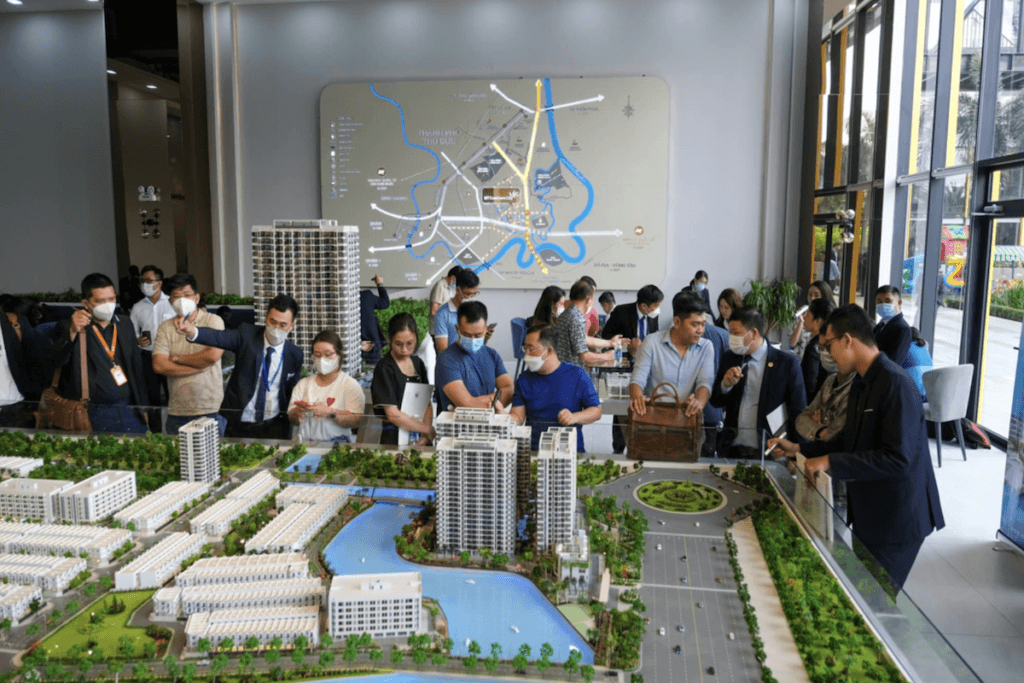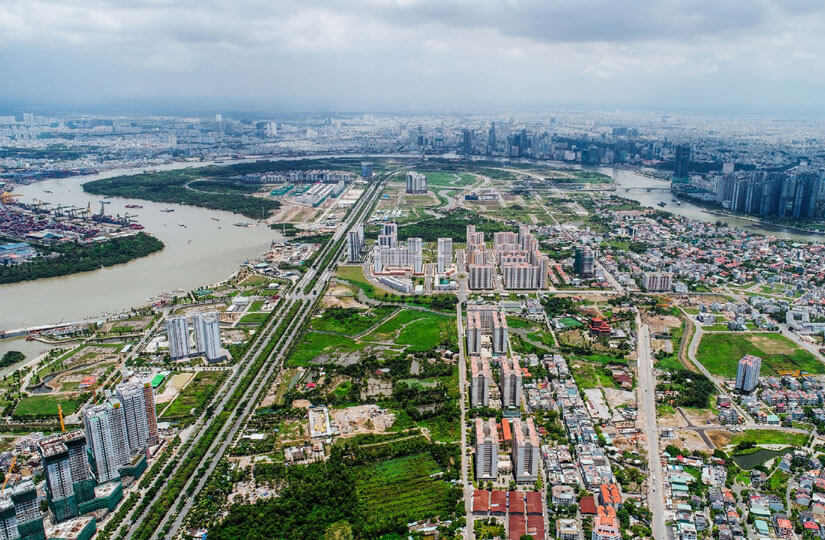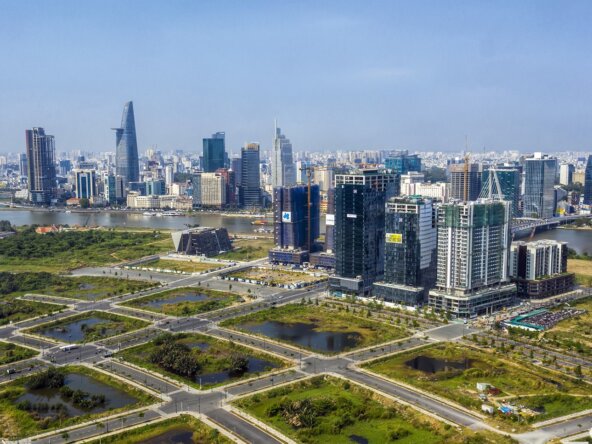The amended Land Law stipulates that economic organizations that are being leased land by the State pay a lump sum for the whole lease period are converted to land leases to pay annual land rent. Accordingly, reducing the financial burden in the early period of project implementation. As a result, the selling price of real estate also has the opportunity to be adjusted to a more reasonable level.
Research data of the Vietnam Association of Real Estate Brokers (VARS) shows that efforts to remove difficulties of the Government, ministries and branches have achieved some remarkable results, the real estate market has had positive changes over time. Although still “modest” compared to the previous period, with the supply and transaction volume of the residential real estate segment in 2023 only equal to 32%; 17% in 2018 – the year without the Covid-19 pandemic. But liquidity in the market is gradually improving with total transactions over quarters in 2023 reaching 2.700; 3.700; 5.778 and 5.710 products.
The recovery process took longer than expected due to regulatory bottlenecks and uncleared funding. The real estate market is forced to continue to maintain a “standby state”. Especially waiting for the removal of legal obstacles – accounting for up to 70% of real estate enterprises, the decisive factor for the formation and development of real estate projects, the key issue needs to be solved to create resilience to help the real estate market recover. Especially problems with land policy.
In 2023, about 500 projects have been removed and redeployed, contributing to strengthening market confidence. However, there are still hundreds of projects waiting for the revised Land Law to have a new mechanism to be dismantled and restarted; Local regulators are also waiting for new regulations to approve new projects.
Accordingly, on January 18, at the National Assembly House, under the chairmanship of National Assembly Chairman Vuong Dinh Hue, the National Assembly concluded the 5th Extraordinary Session. The amended Land Law was passed by the National Assembly with 432 deputies approving (accounting for 87.63% of the total number of deputies). The draft Law after being absorbed and amended includes 16 chapters and 260 articles; has fully understood and institutionalized in accordance with the spirit of Resolution No. 18-NQ/TW dated June 16, 2022 of the 5th Conference of the XIII Party Central Committee, in accordance with the Constitution, synchronous and consistent with the legal system.
VARS believes that the recently passed Land Law (amended) with many new and breakthrough contents will create a more complete and complete legal corridor to solve legal procedures for unfinished projects, promote approval of new projects, add new supply to the market, creating a foundation for the real estate market to recover and develop in a safe, healthy and sustainable direction.
Some major changes in the latest Land Law just passed by the National Assembly focus on key issues for real estate market development such as land lease; provide for compensation and support when acquiring land; auction of land use rights, bidding for projects using land; principles for determining land prices, land price lists and specific land prices; cases of exemption or reduction of land use levy, land rent…

Specifically, some outstanding provisions are as follows: First, stipulated in Clause 2, Article 30, economic organizations that are being leased land by the State for a lump sum payment for the whole lease period are selected to convert to land lease to pay annual land rent. This regulation both supports businesses and adjusts revenue sources in the direction of stimulating revenue from land profits.
Accordingly, enterprises that receive a one-time payment from the State for land lease can switch to land lease to pay annual rent, reducing the financial burden during the initial project implementation. As a result, the selling price of real estate also has the opportunity to be adjusted to a more reasonable level. The investor does not have too much financial pressure, there will also be room to invest in completing the project with better quality. Problems that pose the risk of “project polishing” to serve bank loans and improper capital mobilization will also be reduced somewhat.
On the part of the State, this also contributes to shaping revenue in the direction of stimulating revenue from land profits, not just stopping at collecting “a lump”. This also provides an opportunity to increase revenue for the State thanks to the added value of land over time.
Secondly, the new Law on Land (amended) has removed the provision on land price brackets, determining land prices according to market principles. Specifically, the National Assembly finalized 4 methods of land valuation including: comparative method; income method; surplus method; land price adjustment coefficient method.
The Government is assigned to prescribe other valuation methods not prescribed by law, after obtaining the consent of the National Assembly Standing Committee. This is considered a major breakthrough in the field of land management and use, creating a fundamental change in economic issues in land law policy.
Accordingly, depending on each project and its level and ability to release compensation, the State can flexibly adjust the K factor in a favorable direction. The removal of the land price bracket along with the provision of compulsory payment through banks in Article 48 of the new Law on Real Estate Business, will eliminate the phenomenon of “two-price” transactions, which is the basis for building a transaction data system, promoting the real estate market to develop more transparently, reduction of speculation, virtual fever.
However, in addition to such benefits, it is also necessary to consider the possible negative impact, which is that removing the land price bracket will cause land prices to increase, site clearance compensation increases, and increased investment costs may cause real estate prices to increase, due to the transfer of costs into costs. However, VARS says that impact, if any, is short-term. In the long run, the market is determined by the real supply-demand balance.
Third, tighten conditions for transferring land use rights, help transparency of project transfer, do not cause loss of assets, while ensuring the State’s management rights to national security issues and social benefits. Specifically, according to the provisions of Article 45 of the recently passed Land Law, in addition to the general provisions on conditions for transferring land use rights as at present, in case investors transfer land use rights that already have technical infrastructure in real estate projects, they are also required to meet other conditions as prescribed by the Business Law real estate, Housing Law.
Accordingly, the new Law on Real Estate Business stipulates that, before transferring land use rights with technical infrastructure in real estate projects to individuals who build houses by themselves, the project investor must send a written notice to the provincial-level state management agency in charge of real estate business about the eligibility of land use rights; assigned.

Fourth, according to Clause 8, Article 202 of the latest Law on Land (amended), the land area for the construction of worker accommodation houses in industrial parks according to the planning shall be managed as commercial and service land and entitled to incentives as prescribed by law. Including incentives for exemption and reduction of land rent. This regulation will encourage investors to build accommodation houses for workers, serving the accommodation needs of workers in industrial parks and export processing zones. This is also an opportunity to develop the model of industrial – urban – service park, in which the industrial park has the main function, the urban – service area has the function of supporting, providing services, public and social utilities for the industrial park. Thereby, ensuring that the State’s guidelines and policies are put into practice, aiming to ensure better accommodation conditions for employees.
Fifth, Article 122 adds content allowing enterprises that violate the provisions of the land law to have the opportunity to “remedy their violations and return to the track”.
Specifically, the new Land Law stipulates that the subject “does not violate the provisions of the land law or violate the provisions of the land law but has completed the observance of the legally effective decision or judgment of the competent authority at the time of requesting land allocation, land lease, permission to change land use purposes” is allocated or leased land by the State, allowing change of land use purposes for the implementation of investment projects.
This regulation will contribute to creating conditions for businesses to have the opportunity to “correct wrongs”, in accordance with the spirit of “hit the runner, no one beats the runner back”. However, this regulation promotes a positive view, but does not create germs, posing a safety risk. Creating loopholes for individuals and businesses to influence the market and damage the State, there should be very specific regulations.
Accordingly, the penalties for violations must be enough to deter, so that businesses “do not dare to trade”. Avoid as much as possible the case of “knowing wrong but still doing it deliberately”. In addition, there should also be a limit to control violations. Avoid wrongdoing, fixing, redoing, wrong again and fixing again.
In addition to the new contents that have a positive impact on the real estate market, VARS recognizes that the Land Law 2024 still has some shortcomings, not really synchronized with the Law on Housing 2023, the Law on Real Estate Business 2023, especially the lack of flexibility in accessing land for individuals, foreign organizations.
Specifically, the Land Law does not add “foreign individuals” who have land use rights associated with houses owned in Vietnam in accordance with the Law on Housing. There is no mechanism to allow FDI enterprises to be approved for investment policies, but the project is not subject to land acquisition by the State; there are no regulations on how to allocate land to FDI enterprises;
Although it will not officially take effect until 2025, VARS expects that the new provisions in the Land Law will first of all be the basis to contribute to invigorating confidence for the market. Next is to remove difficulties for businesses, open up congested projects, add new supply to the market to pull down house prices, help people get closer to the dream of settling down.
At the same time, the Government should soon issue documents, decrees and circulars detailing and guiding the implementation of the Land Law, to ensure that the Land Law (amended) after coming into effect soon comes into life and takes effect simultaneously with the Law on Housing 2023 and the Law on Real Estate Business 2023.




